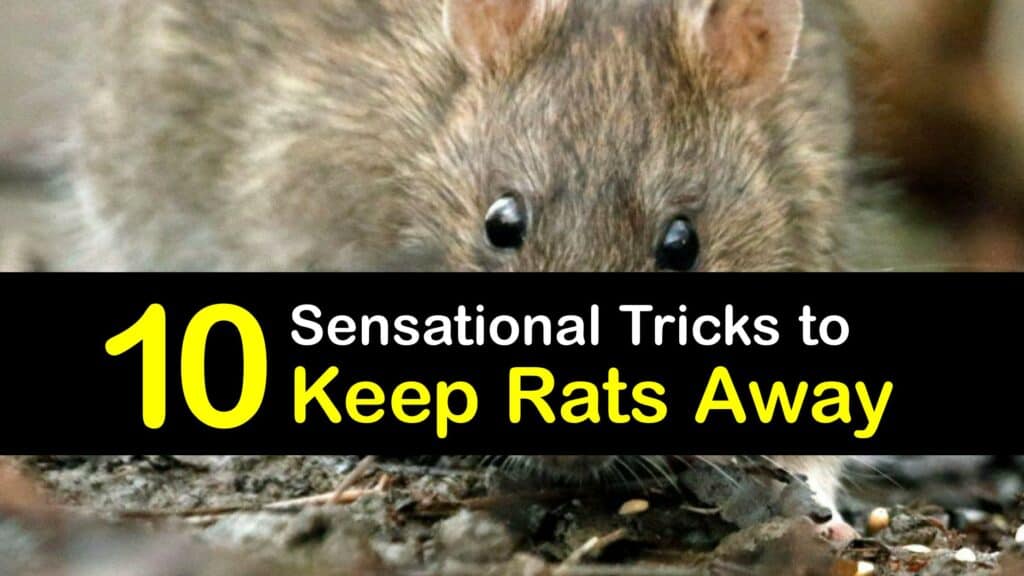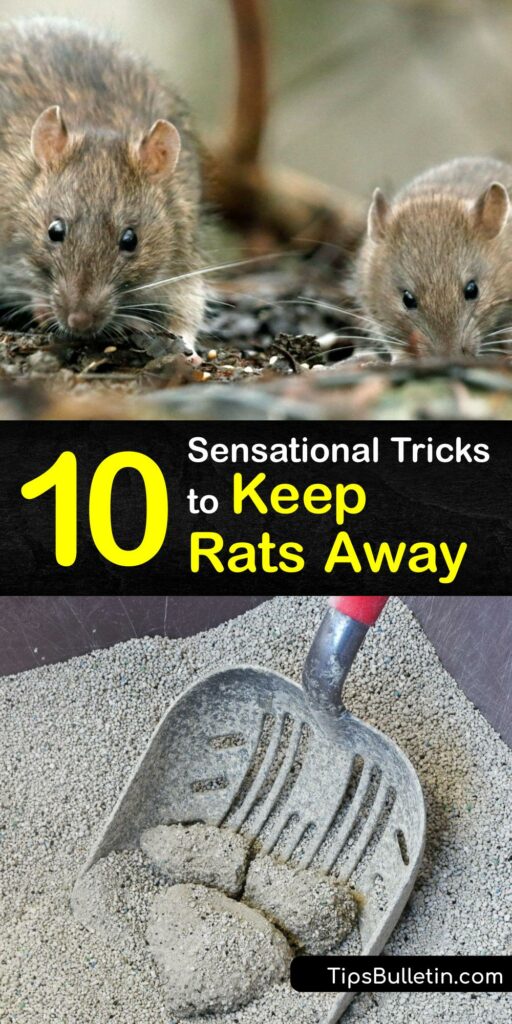Rats are among the most difficult household pests to eradicate and are present across the United States. They spread disease and endanger the health of occupants of rat-infested homes. Rats breed quickly (some species produce as many as 2,000 young in a year) and flourish everywhere they have access to shelter, food, and water. Every homeowner should understand how to keep rats away to protect their property.
Rats consume lizards and birds, but they are essentially scavengers who feed on food stuff they find. Why is it so crucial to know what keeps rats away? Rats can impair the structural integrity of your house, gnaw through cables, destroy furniture, and do a lot more expensive or irreparable damage.
There are several easy techniques for keeping rats away from your house. Rats and mice put your family at risk of severe illnesses such as rat-bite fever. Whether you prefer natural or conventional methods, begin pest control as soon as you detect rats.

- What Keeps Rats Away?
- What Attracts Rats to Your Property?
- Keeping Rats Away from Your House with Mothballs
- Natural Ways to Keep Rats Away – Essential Oils
- Use Kitty Litter to Scare Rats Away
- Repel Rats with Cayenne Pepper
- Remove Food Sources to Deter the Rat Population
- How to Keep Rats Away Using Natural Predation
- Set Live Traps to Relocate Rats Away from Your Home
- Try a Snap Trap for Your Rat Infestation
- Rat Control with a Glue Trap
What Keeps Rats Away?
Rats are difficult to eradicate because they are so widespread. These rodents flourish and threaten public health if people unintentionally provide them with the necessary resources. Since they’ll always be present, it’s crucial to have a plan for how to keep rats away.
Rats are omnivores; they consume anything in their path. However, they are commonly associated with eating leftover food and rummaging through rubbish. They may go up to a month without drinking water.
Rats seek shelter in residences behind walls, under furniture, or in remote, dark areas of the household. Keeping rats away from your house saves you from potential illness and prevents harm to your belongings.
What Attracts Rats to Your Property?
Whether you have a Norway rat, a black rat, or a group of roof rats, they’re all drawn by the same factors. These critters search for a clear entry point to allow them unrestricted access indoors, secluded places to shelter, and nesting material.

Food is a significant rat attractant and is scented by these pests from considerable distances, luring them to its location.
Since rats are nocturnal or do most of their foraging for food at night, the only signs to begin pest control might be rat droppings or finding a dead rat. As soon as you suspect rodents, begin setting rat traps to ascertain the severity of the issue.
Keeping Rats Away from Your House with Mothballs
Mothballs are an inexpensive solution for a rodent problem. Mothballs keep rats and even spiders away. The naphthalene balls are highly toxic and emit a strong aroma to repel rats. Wear gloves while placing mothballs in and around your house, and be sure to put them out of reach of pets and children to avoid harm. Replace mothballs if you notice their efficiency waning.
Natural Ways to Keep Rats Away – Essential Oils
Essential oils feature in multiple home remedies thanks to their versatility in fragrance and discouraging pests. Rats hate the smell of these oils and abandon locations where they’re present.
Choose your favorite rat-repelling essential oil from this list, and eradicate rodents from your home. To make a natural rat repellent for home and garden areas, put essential oil on a cotton ball and set it in an area of rat activity.
To treat larger rooms, mix 20 drops of essential oil with two cups of water and use it as a rodent-repelling spray wherever necessary.
Use Kitty Litter to Scare Rats Away
Cats naturally prey upon rats, and their existence in a location significantly warns rodents to stay far away. If you keep a cat as a pet, you already have a ton of free rat repellent to fill rat burrows, though some may find this strategy unconventional.
Fill a few little paper bowls or cups with used kitty litter granules and position them around as a scent-based deterrent. Rats passing by who smell your cat’s pee leave your area so they won’t be pursued and killed by a hungry feline.
Repel Rats with Cayenne Pepper
Find the remedy for your rat problem in your spice cabinet. Since rodents like mice and rats have susceptible olfactory systems or sense of smell, specific aromas dramatically affect them. Use scents to repel mice and rats. Cayenne pepper is a very aromatic, hot substance for seasoning meals.
To deter rodents, liberally sprinkle pepper around your house, replacing it every few days. To utilize cayenne pepper as a safe way of achieving rat control and prevention, head to the spice rack or get some at your neighborhood food market.
Cayenne pepper is edible and won’t negatively impact your pets or children if they eat it, though it is unpleasant.
Remove Food Sources to Deter the Rat Population
An abundant food source is one of the biggest rat attractants. Securing edibles may seem simple, yet rats’ willingness to eat anything makes it crucial to consider.
Seal food in a rodent-proof tub with a tight lid, keep your kitchen clean and collect any trash to avoid accidentally feeding rat pests.
How to Keep Rats Away Using Natural Predation
Cats worldwide are widely recognized for their ability to trap and kill rats. In many ways, rats are the ideal prey for cats. They like following their target and waiting to pounce as they move around unpredictably.
As any cat owner knows, even domesticated cats are reasonably skilled at hunting. Kittens learn how to search for and catch prey in a feral environment. Cats kill billions of creatures every year, including rodents and birds. Cats are a well-known home remedy to kill a rat, but they are also skilled at eliminating other small mammals like rats.
If you have a pet cat, consider allowing them into the rat-infested space to hunt the vermin. Be sure you aren’t using other pest control techniques like poison, glue, or snap traps that could accidentally harm your pet.
Set Live Traps to Relocate Rats Away from Your Home
A live rat trap is a humane and ethical mode of rat removal and a rat poison alternative. Consider a live trap if you don’t feel comfortable using potentially cruel traps or prefer not to put your pets and children at risk of injury from poison or mechanical traps. Make a simple DIY bucket rat trap – it is quick to construct and virtually free as it relies on popular household items.
Put the food bait on the spoon and balance it on the end of a countertop or table with the bucket positioned directly below; the rat steps onto the spoon to get the food and tumbles into the bucket.
This trap leaves no disgusting cleanup and doesn’t rely on close contact with the rodent. Slip the cover over the bucket in the morning and relocate the rat to an appropriate release point.
Try a Snap Trap for Your Rat Infestation
Snap traps are one of the oldest rat and mouse traps and work best for a minor infestation or when rodenticides are not recommended. A snap trap is a wood, metal, or plastic trap with a robust mechanism for snapping shut to kill rats.
Snap traps are designed to be deadly rodent traps. However, they often cause horrific injury and leave dispatching the animal and messy cleanup for the user. Use the best bait for a rat trap and set snap traps per the manufacturer’s instructions and place them out of the reach of children and innocent animals.
Rat Control with a Glue Trap
Strips of a board with a strong adhesive on them are called glue traps. Although typically unpleasant to use and carry a significant danger of accidentally hurting a pet, a family member, or wildlife, glue traps effectively kill rats, crawling insects, and other small animals.
When rats step on the glue, they become caught and frequently mutilate themselves to get away before they experience an inhumane death. After this rat and mouse trap catches rats, the user must dispose of the injured or dead rodent.
Sticky or glue traps are functional but should only be used as a last choice if a more compassionate and convenient trap is unavailable. Glue boards stick to clothing, pet fur, and even the skin, causing injury to kids, family pets, and unsuspecting wildlife.
Discover what keeps rats away to safeguard your home from these intruders. A rodent infestation is a nightmare for most homeowners, so it pays to be proactive in preventing rats. If you’re already experiencing rat activity, address your rat problem with simple techniques and reclaim your home from these furry pests.

If you enjoyed this comprehensive article on how to keep rats away, please share these excellent ideas for keeping rats away from your house with your friends and family who struggle with rodents on Pinterest and Facebook.